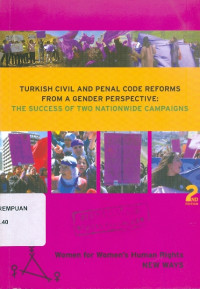
Text
Turkish civil and penal code reforms from a gender perspective: the success of two nationwide campaigns
Describes the key gains the New Civil and Penal Codes have brought to women's lives and provides information on the laws and regulations shaping women's lives in Turkey. The issues covered range from domestic violence to women's participation, and from sexual rights to women's right to economic independence. Women for Women's Human Rights (WWHR) - NEW WAYSNew publication from Women for Women's Human Rights (WWHR) - NEW WAYS detailing the success of two nationwide campaigns. This publication includes the stories and results of two successful campaigns by the women's movement in Turkey: The Campaign on the Reform of the Penal Code from a gender Perspective conducted between 2002-2004 and the civil code reform campaign in 2000-2001. It also describes in a concise yet comprehensive manner the legal status of women in Turkey with the new laws in both private and public spheres. Covering a wide array of fields ranging from marriage to economic rights; from sexual and reproductive rights to violence against women, the booklet provides an excellent resource for advocacy and research on women's human rights and recent gains in Turkey, the Civil and Penal Code Reforms from a Gender Perspective and an overview of the two campaigns.
On September 26, 2004, a draft law aimed at the reform of the Turkish Penal Code was accepted in the Turkish Parliament as the result of a successful three-year campaign (2002-2004) led by a Platform of women’s and LGBT (Lesbian, Gay, Bisexual and Transgender) organizations (The Platform for the Reform of the Turkish Penal Code). The campaign was successful in realizing more than 35 amendments towards recognition of women’s legal entitlement to sexual and bodily autonomy and rights despite strong opposition from the right-wing, Islamist AKP (Justice and Development Party) government. The campaign aimed to transform the underlying philosophy and principles of the old penal code that constructed women’s bodies and sexuality as belonging to their families, fathers, husbands and society; eliminate all articles in the old penal code that constituted violations of women’s human rights, particularly sexual and bodily rights; and to ensure progressive definitions of sexual crimes. Throughout the campaign, advocates emphasized the holistic nature of their demands, stating that their aim was not the revision of a number of articles, but rather a complete reform of the penal code, overhauling the patriarchal framework of the code so as to legally recognize women’s autonomy over their bodies and their sexuality within Turkish law. The three-year campaign succeeded not only in a revolutionary change of the underlying philosophy of the Turkish Penal Code towards the recognition of women’s autonomy over their sexuality and bodies, but also in achieving 35 amendments of the penal code, which were strongly opposed by the government at the beginning of the campaign, constituting a groundbreaking shift in the overall perspective of the Turkish state and the public on the issue. The campaign, which triggered numerous, wide-ranging public debates and made frequent front page headlines in the media, occupied the public agenda in Turkey for three years, generated the widest discussion and broke several taboos on issues related to sexuality in Turkey. This chapter aims to provide a critical account of the campaign, its actors and the factors that contributed to its success. It draws on the author’s personal experience as the co-founder of the Women’s Working Group on the Penal Code, that initiated the campaign and coordinator of the NGO, Women for Women’s Human Rights (WWHR) – NEW WAYS, which acted as the coordinating body of the campaign during the entire process. The historical and political co
Availability
| KP.II.000223 | KP.II ANI t | My Library | Available |
Detail Information
- Series Title
-
-
- Call Number
-
KP.II ANI t
- Publisher
- Istanbul : Women for Women's Human Rights ( WWHR)., 2006
- Collation
-
74p. : ill. ; 21cm.
- Language
-
English
- ISBN/ISSN
-
9759267748
- Classification
-
KP.II
- Content Type
-
-
- Media Type
-
-
- Carrier Type
-
-
- Edition
-
second
- Subject(s)
- Specific Detail Info
-
-
- Statement of Responsibility
-
-
Other version/related
No other version available
File Attachment
Comments
You must be logged in to post a comment
 Computer Science, Information & General Works
Computer Science, Information & General Works  Philosophy & Psychology
Philosophy & Psychology  Religion
Religion  Social Sciences
Social Sciences  Language
Language  Pure Science
Pure Science  Applied Sciences
Applied Sciences  Art & Recreation
Art & Recreation  Literature
Literature  History & Geography
History & Geography